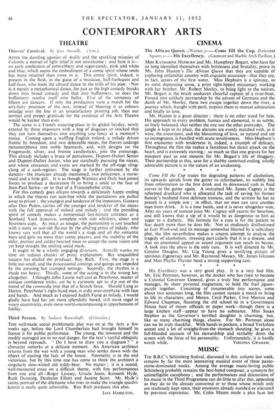CINEMA
Mrss KATHARINE HEPBURN and Mr. Humphrey Bogart, who have for so long identified themselves with brittleness and brutality, prove in Mr. John Huston's The African Queen that . they are capable of exploring unfamiliar country with exquisite assurance—that they are, in fact, actors of the first water. Miss Hepburn is a spinster, in its most depressing sense, a prim tight-lipped missionary working with her brother, Mr. Robert Morley, to bring light to the, natives. Mr. Bogart is the brash unshaven cheerful captain of a river-boat. Forced into unlikely partnership by the advent of Germans and the death of Mr. Morley, these two escape.together down the river, a journey which, fraught with peril, inspires them to mutual admiration and finally to love.
Mr. Huston is a great director ; there is no other word for him. His approach to every problem, human and elemental, is so subtle, so finely balanced, that neither the one nor the other protrudes. The jungle is kept in its place, the alarums are evenly matched with, as it were, the excursions, and the blossoming of love, so natural and yet so incongruous, is handled with acute sensitiveness. Miss Hepburn's first encounter with tenderness is, indeed, a triumph of delicacy. Throughout the film she makes a fastidious but direct attack OR the heart, and is extremely moving.; so much so that one grieves for her misspent past as one mourns for Mr. Bogart's life of thuggery. Their partnership in this, save for a shabby contrived ending, wholly admirable picture is in the nature of an awakening. '
Come Fill the Cup traces the degrading patterns of alcoholism, its upwards spirals from the gutter to reformation, its wobbly line from reformation to the first drink and its downward rush in fluid curves to the gutter again. A restrained Mr. James Cagney is the reformed drunkard who is allocated the task of saving his former -fiancee's husband from delirium tremens, and the sermon he has to preach is a simple one ; in effect, that no man can save another man from drink. It is a lone battle, and it is never altogether won. After six years of tomato juice Mr. Cagney still yearns for bourbon, and still knows that a sip of it would be as dangerous to him as sugar to a diabetic. His formula for a cure is for the patient to fear death more than he does life. Not as studiously disillusioned as Lost Week-end, and its message somewhat blurred by a subsidiary plot, the film nevertheless makes a sincere attempt to analyse the tragedy of alcoholism, stressing part:cularly that it is a disease, and that no emotional appeal or sound argument can reach its bearer. A look into the abyss is the only cure. It is well directed by Mr. Gordon Douglas, Mr. Gig Young gives a terrifying picture of spiritous degeneracy and Mr. Raymond Massey, Mr. James Gleason and Miss Phyllis Thaxter head a strong supporting cast.
His Excellency was a very good play. It is a very bad film. Mr. Eric Portman, however, as the docker who has risen to become a Colonial Governor General, gives a truly fine performance and manages, by sheer personal magnetism, to hold the frail jigsaw- puzzle together. Consisting of innumerable tiny scenes, some about two sentences long, the film cannot sustain a mood or bring to life its characters, and Messrs. Cecil Parker, Clive Morton and Edward Chapman, flaunting the old school tie in a Government House bare of minor officials or paper work—though there is a large kitchen staff—appear to have no substance. Miss Susan Stephen as the Governor's terrified daughter is charming, but, like so many charming things, elusive. For Mr. Portman alone can we be truly thankful. With hands in pockets, a broad Yorkshire accent and a lot of straight-from-the stomach shouting, he gives a full-blooded Account of his stewardship and veritably dents the screen with the force of his personality. Unfortunately, it is hardly


































 Previous page
Previous page